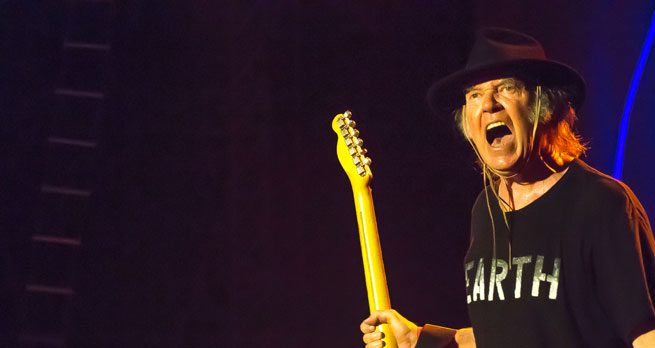A new book on the musical travels of Neil Young, one of the most significant recording and performing artists of the late twentieth and early twenty-first centuries, argues that the singer-songwriter is one of only a few music industry figures to still engage in social activism.
 Neil Young in 2014
Neil Young in 2014
Professor Martin Halliwell from the University of Leicester’s Centre for American Studies has just published Neil Young: American Traveller, the first book to systematically focus on the importance of place and travel in the songwriter’s music, films, memoirs, and social activism.
The book claims that travel is more important to Neil Young than to most other musicians. As a boy growing up in Canada in the 1950s Young showed an early fascination with cars and trains, and he has since journeyed through the Americas, literally on his one-way road trip from Toronto to Los Angeles in 1966, and imaginatively across the continent, through the American South, and into Central and South America. Young’s music also travels, seeing him shift from folk, rock and country to electronica, grunge and noise, and back again, over 50 years since he emerged on the music scene in the mid-1960s.
Professor Halliwell commented on how Young’s strong activist voice weaves through these musical journeys: “One could argue that at 70 Young is more relevant to audiences than ever before. He keeps alive the possibility that music can make a difference by raising awareness of issues that often get submerged within a culture industry geared towards entertainment and consumption.
“Young is deliberately provocative about social causes because he believes that very few in the music industry are willing to speak out, pushing his listeners to think about their values on a range of subjects from environmentalism and agriculture to corporate advertising and new technologies.”
This activist spirit stems from what The Guardian has called the “greatest protest song ever”. Young wrote the Crosby, Stills, Nash & Young song “Ohio” in May 1970 in response to the shootings of four Kent State University students by the US National Guard during a peaceful protest against the Vietnam War. His activism has more recently led him to criticize US foreign policy during the Iraq War, off-shore fracking, and the use of GMOs by multinational corporations.
Professor Halliwell continued: “Arguably, Neil Young has more contemporary relevance than Bob Dylan, who is back on the record shelves this week with the release of the 6-album box set 1965-1966 The Cutting Edge. Young’s back-catalogue is as rich as Dylan’s, but he is also releasing new albums almost every year and he tours regularly, including the critically acclaimed North American tour with Promise of the Real this summer and autumn.”
One of the inspirations for Neil Young: American Traveller was the account of a personal road-trip taken by the Canadian author Kevin Chong, as documented in his 2005 book Neil Young Nation.
Commenting on the Halliwell’s new book, Chong said: "In a half-century of music, Young has offered wistful glimpses of the North American landscape. In one moment, he will nostalgically invoke his Canadian past in a piano ballad and, in another, conjure searing guitar rock about racial injustice in the United States. If Neil Young creates a musical map of North America in his songs, then Martin Halliwell has done a wonderful job of annotating it.”
In response to the songwriter’s 70th birthday this week, Halliwell remarked that: “Young’s appetite for exploration and discovery is stronger than ever. The fact that he is continually looking to respond musically to new places and modes of travel shows that he is aware of the social, cultural, political and technological tensions that run through contemporary North American life.”
Neil Young: American Traveller is published by Reaktion Books and distributed by the University of Chicago Press.

Rate and Review
Rate this article
Review this article
Log into OpenLearn to leave reviews and join in the conversation.
Article reviews